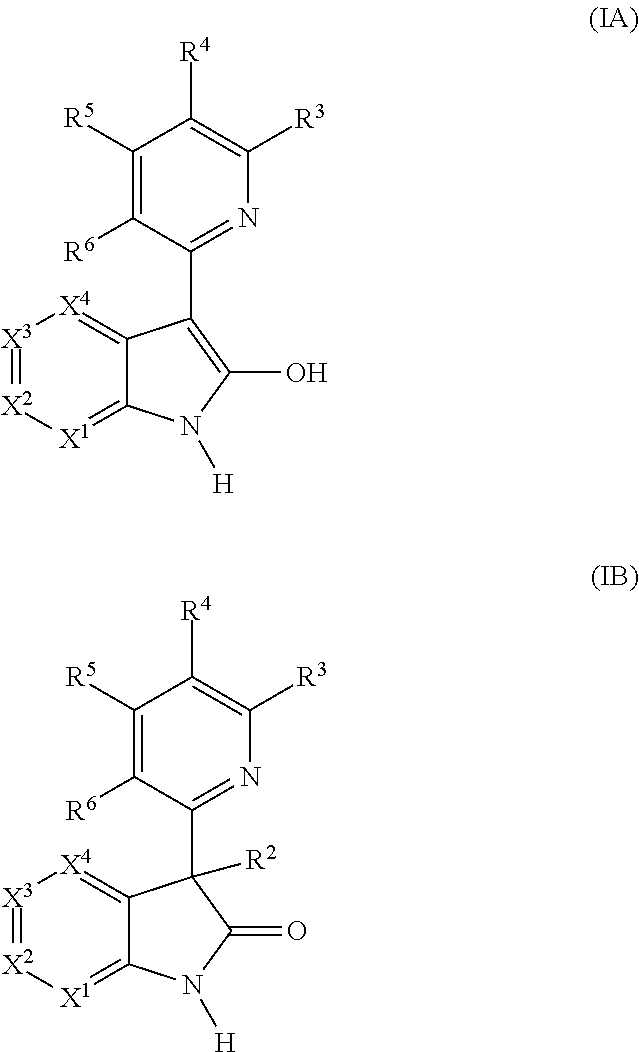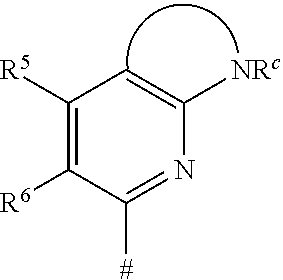Heterocyclic compounds and their use as glycogen synthase kinase-3 inhibitors
a glycogen synthase and glycogen technology, applied in the field of heterocyclic compounds, can solve the problems of neurotrophic activity, inability of pharmacological gsk-3 inhibitors to selectively inhibit one of the isoforms, etc., and achieve the effect of prevention and/or treatmen
- Summary
- Abstract
- Description
- Claims
- Application Information
AI Technical Summary
Benefits of technology
Problems solved by technology
Method used
Image
Examples
examples
[0443]The compounds were either characterized via proton-NMR in d6-dimethylsulfoxide or d-chloroform on a 400 MHz or 500 MHz NMR instrument (Bruker AVANCE), or by mass spectrometry, generally recorded via HPLC-MS in a fast gradient on C18-material (electrospray-ionisation (ESI) mode), or melting point.
[0444]The magnetic nuclear resonance spectral properties (NMR) refer to the chemical shifts (δ) expressed in parts per million (ppm). The relative area of the shifts in the 1H-NMR spectrum corresponds to the number of hydrogen atoms for a particular functional type in the molecule. The nature of the shift, as regards multiplicity, is indicated as singlet (s), broad singlet (s. br.), doublet (d), broad doublet (d br.), triplet (t), broad triplet (t br.), quartet (q), quintet (quint.) and multiplet (m).
Abbreviations:
[0445]DMSO dimethylsulfoxide
DCM dichloromethane
MeOH methanol
EtOAc ethylacetate
THF tetrahydrofurane
TBDMS tert-butyldimethylsilyl
TBFA tert-butylammonium fl...
preparation examples
I. PREPARATION EXAMPLES
Example 1
3-(5-Hydroxy-5,6,7,8-tetrahydroquinolin-2-yl)-2-oxoindoline-5-carbonitrile
[0446]
1.1 5-(tert-Butyldimethylsilyloxy)-2-chloro-5,6,7,8-tetrahydroquinoline
[0447]A solution of 2-chloro-5,6,7,8-tetrahydroquinolin-5-ol (500 mg, 2.72 mmol) in DMF (10 mL) was treated with imidazole (260 mg, 3.81 mmol). After complete dissolution TBDMS-Cl was added and the resulting mixture was stirred at RT for 16 h. The reaction mixture was diluted with EtOAc (40 mL) and was washed with brine (5×). The organic layer was collected, dried with Na2SO4, filtered, and the solvent was evaporated at reduced pressure yielding the titled compound as an oil. Amount 760 mg. Yield 94%.
[0448]1H-NMR (DMSO-d6, 400 MHz) δ 0.16 (d, 6H), 0.89 (s, 9H), 1.70 (m, 1H), 1.78 (m, 1H), 1.95 (m, 2H), 2.79 (m, 2H), 4.84 (dd, 1H), 7.31 (d, 1H), 7.66 (d, 1H);
[0449]MS (ES-API) m / z 298.1 (M+H+, 100%).
1.2 3-(5-(tert-Butyldimethylsilyloxy)-5,6,7,8-tetrahydroquinolin-2-yl)-2-oxoindoline-5-carbonitrile
[0450]To...
example 2
2-Oxo-3-(5,6,7,8-tetrahydro-1,6-naphthyridin-2-yl)indoline-5-carbonitrile
[0456]
2.1 tert-Butyl 2-chloro-7,8-dihydro-1,6-naphthyridine-6(5H)-carboxylate
[0457]To a solution of 2-chloro-5,6,7,8-tetrahydro-1,6-naphthyridine (500 mg, 2.97 mmol) in dioxane (7.4 mL) and water (7.4 mL) was added sodium bicarbonate in as a solid in one portion (498 mg, 5.93 mmol). After stirring the resulting suspension for 10 min at RT Boc2O (777 mg, 3.56 mmol) was added and the mixture was stirred for 16 h. The mixture was diluted with ethyl acetate and the organic layer was washed with water and brine. The organic phase was dried over sodium sulfate, filtered, and evaporated to dryness. Amount 693 mg. Yield 87%.
[0458]1H-NMR (CDCl3, 400 MHz) δ 1.52 (s, 9H), 2.99 (t, 2H), 3.75 (t, 2H), 4.58 (s, 2H), 7.17 (d, 1H), 7.39 (d, 1H)
[0459]MS (ES-API) m / z 369.1 (M+H+, 100%).
2.2 tert-Butyl 2-(5-cyano-2-oxoindolin-3-yl)-7,8-dihydro-1,6-naphthyridine-6(5H)-carboxylate
[0460]
[0461]The title compound was prepared as descri...
PUM
| Property | Measurement | Unit |
|---|---|---|
| Molar density | aaaaa | aaaaa |
| Radioactivity | aaaaa | aaaaa |
Abstract
Description
Claims
Application Information
 Login to View More
Login to View More - R&D
- Intellectual Property
- Life Sciences
- Materials
- Tech Scout
- Unparalleled Data Quality
- Higher Quality Content
- 60% Fewer Hallucinations
Browse by: Latest US Patents, China's latest patents, Technical Efficacy Thesaurus, Application Domain, Technology Topic, Popular Technical Reports.
© 2025 PatSnap. All rights reserved.Legal|Privacy policy|Modern Slavery Act Transparency Statement|Sitemap|About US| Contact US: help@patsnap.com



